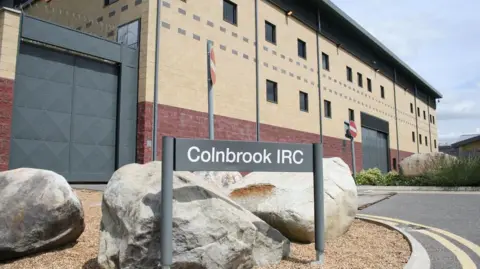 PA
PALawyers representing asylum seekers who were detained to be sent to Rwanda say 79 of their clients have now been released on bail.
Scores of asylum seekers were taken into detention from late April, after Rishi Sunak said that flights would leave in the first weeks of July.
The confirmation of the bailing of dozens of the detainees comes after government lawyers told the High Court that there would be no flight before 24 July at the earliest.
The Home Office has never confirmed the numbers held in detention. The department has been contacted for comment.
Prime Minister Mr Sunak says that if he is returned to power there will be a regular rhythm of flights, starting in July.
Labour has pledged to scrap the policy if it wins the general election on 4 July.

The Liberal Democrats and SNP also say that the scheme should be scrapped because it breaks international law.
The impending general election is not a formal legal test for release from detention – but judges assess in each case whether a flight is reasonably foreseeable.
In a statement on social media platform X, Duncan Lewis Solicitors said: “We represent 50 of those detainees and can confirm that they all now have bail.
“Many clients are survivors of torture and trafficking. The tribunal, in granting bail, rightly assessed them to not carry a risk of absconding, reaching the rational view that removal was not imminent.”
The solicitors said that the detrimental impact “unnecessary and prolonged” detention has had on its clients is “yet to be fully assessed.”
“The extent to which taxpayers’ money has been wasted by detaining people in this way, around the time of the local elections for what appears to be for political gain, when removal was not imminent, needs to be calculated”, the company added.
A second law firm, Wilsons, has told BBC News that all 15 of its clients, who had been similarly detained under “Operation Vector” – the Home Office’s plan to prepare for Rwanda flights – have also been released.
Bail for Immigration Detainees, a legal charity, says that all 14 of its clients have been either bailed by courts or were released by the Home Office to return to accommodation.
Immigration removal and deportation rules say that ministers can only hold people in removal centres if there is a “realistic prospect” they will be put on a flight within a reasonable timeframe.
When courts order the release of people who may still be removed from the UK at a later date, they are typically told to regularly report to officials.
Judges are now managing around a dozen significant legal challenges to the prime minister’s Rwanda plan – and the High Court has ruled the United Nations’ refugee agency should provide expert evidence about alleged ongoing abuses in the country.
Although the future of the policy is uncertain, the courts must work on the basis that flights could take off, until a minister tells them otherwise.






